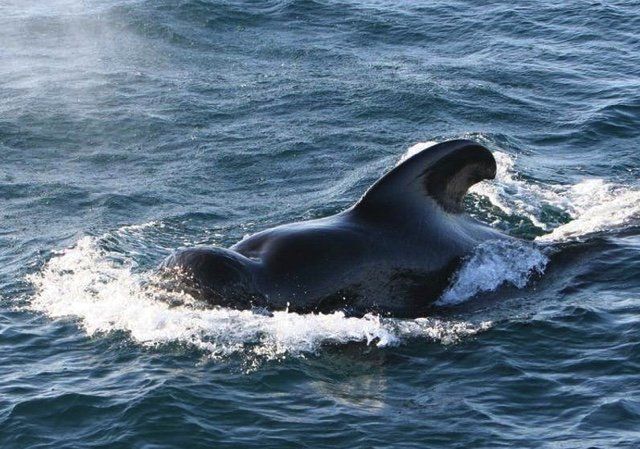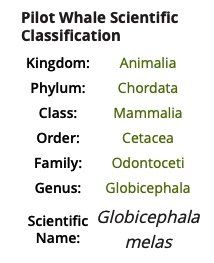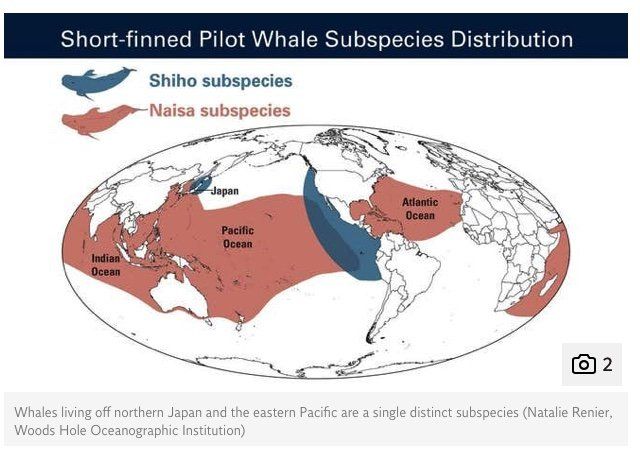New discovery of two separate subspecies of short- finned pilot whale in the Pacific Ocean.
A new study published today in Molecular Ecology has confirmed the existence of the "Naisa" form of short-finned pilot whale, a subspecies long described by Japanese whalers and scientists in the South Pacific. Short-finned pilot whales have a large distribution, ranging over a large area of the world's oceans, with habitats in the Pacific, North Atlantic and Indian oceans. Despite their broad range, until today, short-finned pilot whale was thought to be one single species.
Short-finned pilot whale ( Globicephala macrorhynchus ). Photo: Wikicommons.
Pilot whales are large aquatic mammals belonging to the Globicephala
genus. The genus consists of 2 extant species, the short-finned pilot whale ( Globicephala macrorhynchus
) and the long-finned pilot whale ( Globicephala melas
). Between these two species, the animals are found across the world's oceans. Long finned pilot whales generally prefer cold deep water with some populations permanently remaining offshore. They may move into inshore areas in search of food. The short finned whales in comparison, prefer warm tropical and sub-tropical waters with populations living around the outer boundaries of continental shelves. But, individuals have been reported to move towards the coastal areas, sometimes, far enough onshore to become stranded.
Pilot whales are closely related to the extinct blunt-snouted dolphins. Extant relatives of the whale include the Risso’s dolphin, false killer whale, melon-headed whale and the pygmy killer whale. Pilot whales are often referred to as “Blackfish” along with a number of other species belonging to the Dolphin family.
There are two separate sub-species of long-finned pilot whales: the Southern hemisphere- where they occupy a circumpolar distribution in cold sub-Antarctic waters; and in the Northern hemisphere their range is restricted to the north Atlantic Ocean, the North Sea and the western Mediterranean, from the Azores to Greenland. They favour deep waters, although their seasonal movements may reflect prey distribution. It is long finned pilot whale which we find in Irish waters.
Short-finned pilot whales, in comparison are distributed in the tropical and warm temperate waters of the Atlantic, Pacific and Indian Oceans. Off the southwest coasts of several Canary Islands (especially Tenerife and La Gomera), east off Japan, off Hawaii, in waters off the Azores, in the Monterey Bay, California, and Madeira; nomadic as well as resident groups are frequently sighted.
There is ample opportunity to see short-finned pilot whale from shore in many places which has led to year-round research activities such as photo ID studies, a non-invasive method of identifying individual animals ( read more here..), and the development of whale watching activities (whale watching near you..). Data obtained from fossil findings, stranding events, incidental catches and opportunistic surveys showed that short-finned pilot whales were encountered off French Polynesia, the British Columbia coast, off Peru, Pacific coast of Mexico and Costa Rica, Taiwan (for the Pacific), Brazil, U.S.A., in the Caribbean, Angola, Senegal (for the Atlantic), Indonesia, Malasia, Seychelles, Mozambique, Sri Lanka, and India (for the Indian Ocean).
In 1760 two different types of short-finned pilot whales were first described by a Japanese naturalist called Yamase. Short-finned pilot whales with square-shaped heads in southern Japan were called the “Naisa form” and the round-head variety in northern Japan the “Shiho form”.
Now a new study by lead researcher Amy Van Cise, a postdoctoral scholar at the Woods Hole Oceanographic Institution in Massachusetts has proven the 250 year old theory correct using the latest DNA tests. According to the study published in Molecular Ecology , Dr Cise and her team analysed 725 samples collected by researchers from all over the world and tested their mitochondrial DNA. By comparing this information with known whales and dolphins, researchers could identify that the groups were subspecies, despite the fact the whales are not separated by a continental barrier and what separates them is just the vast expanse of the eastern Pacific Ocean.
Different subspecies of whale is expected in each ocean basin—the Atlantic, Indian, and Pacific. Researchers would consider that to be common. However, what Dr Van Cise found was that short-finned pilot whales in the Atlantic are the same sub-species as those living in the Indian Ocean and western Pacific. Short-finned pilot whales, living off northern Japan and the eastern Pacific however, appeared to be one distinct subspecies.
This new study provides a unique insight into the factors that drove the evolution and speciation of pilot whales in the Southern Hemisphere - , that it may have been in-fact an "ocean deseert" and not physical land barriers that were important.
A taxonomy board is to review the proposal and decide whether these subspecies should be officially given different classifications.
© Ocean Research & Conservation Ireland (ORCireland) and www.orcireland.ie , est. 2017. Unauthorized use and/or duplication of this material without express and written permission from this site’s author and/or owner is strictly prohibited. Excerpts and links may be used, provided that full and clear credit is given to Ocean Research & Conservation Ireland and www.orcireland.ie with appropriate and specific direction to the original content.
Reference:
Amy M. Van Cise, Robin W. Baird, Charles Scott Baker, Salvatore Cerchio, Diane Claridge, Russell Fielding, Brittany Hancock‐Hanser, Jacobo Marrero, Karen K. Martien, Antonio A. Mignucci‐Giannoni, Erin M. Oleson, Marc Oremus, M. Michael Poole, Patricia E. Rosel, Barbara L. Taylor, Phillip A. Morin.
Oceanographic barriers, divergence, and admixture: Phylogeography and taxonomy of two putative subspecies of short‐finned pilot whale
.
Molecular Ecology
, 2019; DOI:
10.1111/mec.15107
SHARE THIS ARTICLE
















